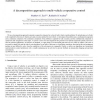Free Online Productivity Tools
i2Speak
i2Symbol
i2OCR
iTex2Img
iWeb2Print
iWeb2Shot
i2Type
iPdf2Split
iPdf2Merge
i2Bopomofo
i2Arabic
i2Style
i2Image
i2PDF
iLatex2Rtf
Sci2ools
RAS
2007
2007
A decomposition approach to multi-vehicle cooperative control
We use a decomposition approach to generate cooperative strategies for a class of multi-vehicle control problems. By introducing a set of tasks to be completed by the team of vehicles and a task execution method for each vehicle, we decompose the problem into a combinatorial component and a continuous component. The continuous component of the problem is captured by task execution, and the combinatorial component is captured by task assignment. In this paper, we present a solver for task assignment that generates near-optimal assignments quickly and can be used in real-time applications. To motivate our methods, we apply them to an adversarial game between two teams of vehicles. One team is governed by simple rules and the other by our algorithms. In our study of this game we found phase transitions, showing that the task assignment problem is most difficult to solve when the capabilities of the adversaries are comparable. Finally, we utilize our algorithms in a hierarchical model pr...
| Added | 27 Dec 2010 |
| Updated | 27 Dec 2010 |
| Type | Journal |
| Year | 2007 |
| Where | RAS |
| Authors | Matthew G. Earl, Raffaello D'Andrea |
Comments (0)

